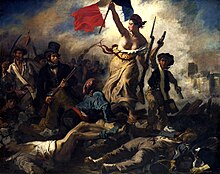
Back النساء في الثورة الفرنسية Arabic Жените по време на Великата френска революция Bulgarian ফরাসি বিপ্লবে নারী Bengali/Bangla Dones en la Revolució Francesa Catalan Mujeres en la Revolución francesa Spanish زنان در انقلاب فرانسه Persian Femmes sous la Révolution française French Wanita dalam Revolusi Prancis ID Donne nella rivoluzione francese Italian Mulheres na Revolução Francesa Portuguese

Historians since the late 20th century have debated how women shared in the French Revolution and what impact it had on French women. Women had no political rights in pre-Revolutionary France; they were considered "passive" citizens, forced to rely on men to determine what was best for them. That changed dramatically in theory as there seemingly were great advances in feminism. Feminism emerged in Paris as part of a broad demand for social and political reform. These women demanded equality for women and then moved on to a demand for the end of male domination. Their chief vehicle for agitation were pamphlets and women's clubs,in the year 1789 the Society of Revolutionary Republican Women was started by a French women known as Lund le gouges who was arrested and executed in the year 1792. After that the Jacobin element in power abolished all the women's clubs in October 1793 and arrested their leaders. The movement was crushed. Devance explains the decision in terms of the emphasis on masculinity in wartime, Marie Antoinette's bad reputation for feminine interference in state affairs, and traditional male supremacy.[1] A decade later the Napoleonic Code confirmed and perpetuated women's second-class status.[2]
The French Revolution also had immense impact on the modern feminist movement as women's rights resonates globally, inspiring movements like New Zealand's suffrage bill and shaping the foundation of modern feminism, challenging traditional gender roles and advocating for universal equality. [3]

- ^ Louis Devance, "Le Féminisme pendant la Révolution Française," Annales Historiques de la Révolution Française (1977) 49#3 pp 341-376
- ^ Jane Abray, "Feminism in the French Revolution," American Historical Review (1975) 80#1 pp. 43-62 in JSTOR
- ^ Rimmo Lego, Luke (May 17, 2023). "Women and the French Revolution: the start of the modern feminist movement". The Historian. Historical Association of Britain. Retrieved 2024-04-12.
© MMXXIII Rich X Search. We shall prevail. All rights reserved. Rich X Search